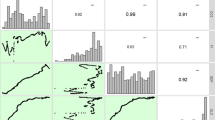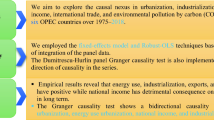Abstract
This study attempts to empirically examine the impact of financial development, income, trade openness, and urbanization on carbon dioxide emissions for the panel of emerging economies using the time series data over the period 1990–2013. Results showed a positive monotonic relationship between income and CO2 emissions. All models do not support the EKC hypothesis which assumes an inverted U-shaped relationship between income and environmental degradation. Financial development has a long-run negative impact on carbon emissions, implying that financial development minimizes environmental degradation. This means that financial development can be used as an implement to keep the degradation environmental clean by introducing financial reforms. The urbanization decreases the CO2 emissions; therefore, it is important for the policymakers and urban planners in these countries to slow the rapid increase in urbanization.
Similar content being viewed by others
References
Ali HS, Yusop ZB, Hook LS (2015) Financial development and energy consumption Nexus in Nigeria: an application of ARDL bound testing approach. Int J Energy Econ Policy 5(3):816–821
Al-mulali U, Sab CNBC (2012) The impact of energy consumption and CO2 emission on the economic and financial development in 19 selected countries. Renew Sust Energ Rev 16(7):4365–4369
Altaee HHA, Al-Jafari MK (2015) Financial development, trade openness and economic growth: a trilateral analysis of Bahrain. Int J Econ Finan 7:1
Arellano M, Bond S (1991) Some tests of specification for panel data: Monte Carlo evidence and an application to employment equations. Rev Econ Stud 58:277–297
Arellano M, Bover O (1995) Another look at the instrumental variable estimation of error-component models. J Econ 68:29–51
Ben Aissa MS, Ben Jebli M, Ben Youssef S (2014) Output, renewable energy consumption and trade in Africa. Energ Policy 66:11–18
Blundell RW, Bond SR (1998) Initial conditions and moment restrictions in dynamic panel data models. J Econ 87:115–143
Boutabba MA (2014) The impact of financial development, income, energy and trade on carbon emissions: evidence from the Indian economy. Econ Model 40:33–41
Bozkurt C, Akan Y (2014) Economic growth, CO2 emissions and energy consumption: the Turkish case. Int J Energy Econ Policy 4(3):484–494
Bruyn S, van den Bergh J, Opschoor J (1998) Economic growth and emissions: reconsidering the empirical basis of environmental Kuznets curves. Ecol Econ 25:161–175
Dasgupta S, Hong JH, Laplante B, Mamingi N (2006) Disclosure of environmental violations and stock market in the Republic of Korea. Ecol Econ 58(4):759–777
Granger CWJ (1988) Some recent developments in a concept of causality. J Econ 39:199–212
Grossman GM, Krueger AB (1993) Environmental impacts of a North American free trade agreement. In: Garber P (ed) The U.S.-Mexico free trade agreement. MIT Press, Cambridge
Halicioglu F (2009) An econometric study of CO 2 emissions, energy consumption, income and foreign trade in Turkey. Energy Policy 37:1156–1164
Hossain MSH (2011) Panel estimation for CO2 emissions, energy consumption, economic growth, trade openness and urbanization of newly industrialized countries. Energ Policy 39(2011):6991–6999
Hua-jun L (2012) The influence of urbanization on carbon dioxide emissions: an empirical evidence from China [J]. Shanghai J Econ 5:002
Im KS, Pesaran MH, Shin Y (2003) Testing for unit roots in heterogeneous panels. J Econ 115:53–74
Jalil A, Feridun M (2012) The impact of growth, energy and financial development on the environment in China: a cointegration analysis. Energ Econ 33(2):284–291
Kao C (1999) Spurious regression and residual-based tests for cointegration in panel data. J Econ 90:1–44
Kohler M (2013) CO2 emissions, energy consumption, income and foreign trade: a South African perspective. Energ Policy 63:1042–1050
Kuznets S (1955) Economic growth and income inequality. Am Econ Rev 45:1–28
Levin A, Lin CF, Chu CSJ (2002) Unit root tests in panel data: asymptotic and finite-sample properties. J Econ 108:1–24
Managi S, Hibiki A, Tsurumi T (2009) Does trade openness improve environmental quality? J Environ Econ Manag 58(3):346–363
Martínez-Zarzoso I, Maruotti A (2011) The impact of urbanization on CO2 emissions: evidence from developing countries. Ecol Econ 70(7):1344–1353
Mbarek MB, Ali NB, Feki R (2014) Causality relationship between CO2 emissions, GDP and energy intensity in Tunisia. Environ Dev Sustain 16:1253–1262
Moghadam HE, Lotfalipour MR (2014) Impact of financial development on the environmental quality in Iran. Chin Bus Rev 13:537–551
Muhammad J, Fatima GS (2013) Energy consumption, financial development and CO2 emissions in Pakistan. Online at http://mpra.ub.uni-muenchen.de/48287/ MPRA Paper No. 48287, posted 15. July 2013 13:32 UTC
Naranpanawa A (2011) Does trade openness promote carbon emissions? Empirical evidence from Sri Lanka. Empir Econ Lett 10(10):1681–8997
Omri et al. (2015) Financial development, environmental quality, trade and economic growth: what causes what in MENA Countries? http://www.ipag.fr/fr/accueil/la-recherche/publications-WP.html
Ozturk I, Acaravci A (2013) The long-run and causal analysis of energy, growth, openness and financial development on carbon emissions in Turkey. Energy Econ 36(2013):262–267
Panayotou T (1993) Empirical tests and policy analysis of environmental degradation at different stages of economic development. Technology and Employment Programme, International Labour Office, Geneva, Working Paper WP238
Pedroni P (2004) Panel cointegration: asymptotic and finite sample properties of pooled time series tests with an application to the PPP hypothesis: new results. Econometric Theory 20:597–627
Sadorsky P (2010) The impact of financial development on energy consumption in emerging economies. Energ Policy 38:2528–2535
Saidi K, Hammami S (2015a) Economic growth, energy consumption and carbon dioxide emissions: recent evidence from panel data analysis for 58 countries. Qual Quant. doi:10.1007/s11135-014-0153-1
Saidi K, Hammami S (2015b) The effect of energy consumption and economic growth on CO2 emissions: evidence from 58 countries. Bull Energy Econ 3(3):91–104
Sbia R et al (2014) A contribution of foreign direct investment, clean energy, trade openness, carbon emissions and economic growth to energy demand in UAE. Econ Model 36:191–197
Shafik N, Bandyopadhyay S (1992) Economic growth and environmental quality: time series and cross-country evidence. Background paper for the world development report 1992, the World Bank, Washington DC
Shahbaz et al. (2011) The effects of financial development, economic growth, coal consumption and trade openness on environment performance in South Africa. Online at http://mpra.ub.uni-muenchen.de/32723/ MPRA Paper No. 32723, posted 10. August 2011 04:18 UTC
Shahbaz et al (2013a) Economic growth, energy consumption, financial development, international trade and CO2 emissions in Indonesia. Renew Sust Energ Rev 25:109–121
Shahbaz M et al (2013b) The dynamic links between energy consumption, economic growth, financial development and trade in China: fresh evidence from multivariate framework analysis. Energ Econ 40:8–21
Sharma SS (2011) Determinants of carbon dioxide emissions: empirical evidence from 69 countries. Appl Energy 88:376–382
Tamazian A, Rao B (2010) Do economic, financial and institutional developments matter for environmental degradation? Evidence from transitional economies. Energy Econ 32(1):137–145
Tamazian A, Chousa JP, Vadlamannati KC (2009) Does higher economic and financial development lead to environmental degradation: evidence from BRIC countries. Energ Policy 37(1):246–253
Wang Y, Chen L, Kubota J (2015a) The relationship between urbanization, energy use and carbon emissions: evidence from a panel of Association of Southeast Asian Nations (ASEAN) countries. J Clean Prod. doi:10.1016/j.jclepro.2015.06.041
Wang Y, Zhang X, Kubota JP, Zhu XD, Lu GF (2015b) A semi-parametric panel data analysis on the urbanization-carbon emissions nexus for OECD countries. Renew Sustain Energy Rev 48:704–709
Wang Y, Han Rλ, Kubota J (2016) Is there an environmental Kuznets Curve for SO2 emissions? A semi-parametric panel data analysis for China. Renew Sust Energy Rev, 54, 1182–1188
Yang J, Zhang Y, Meng Y (2015) Study on the impact of economic growth and financial development on the environment in China. J Syst Sci Inf 3(4):334–347
Yazdi SK, Shakouri B (2014) The impact of energy consumption, income, trade, urbanization and financial development on carbon emissions in Iran. Adv Environ Biol 8:1293–1300
Zhang Y-J (2011) The impact of financial development on carbon emissions: an empirical analysis in China. Energ Policy 39:2197–2203
Zhang YJ, Yi WC, Li BW (2015) The impact of urbanization on carbon emission: empirical evidence in Beijing. Energ Proc 75:2963–2968
Author information
Authors and Affiliations
Corresponding author
Additional information
Responsible editor: Philippe Garrigues
Rights and permissions
About this article
Cite this article
Saidi, K., Mbarek, M.B. The impact of income, trade, urbanization, and financial development on CO2 emissions in 19 emerging economies. Environ Sci Pollut Res 24, 12748–12757 (2017). https://doi.org/10.1007/s11356-016-6303-3
Received:
Accepted:
Published:
Issue Date:
DOI: https://doi.org/10.1007/s11356-016-6303-3




